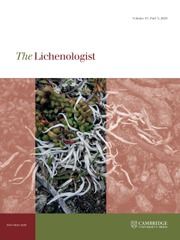Crossref Citations
This article has been cited by the following publications. This list is generated based on data provided by
Crossref.
Muggia, Lucia
Schmitt, Imke
and
Grube, Martin
2008.
Purifying selection is a prevailing motif in the evolution of ketoacyl synthase domains of polyketide synthases from lichenized fungi.
Mycological Research,
Vol. 112,
Issue. 2,
p.
277.
Chooi, Yit-Heng
Stalker, David M.
Davis, Meryl A.
Fujii, Isao
Elix, John A.
Louwhoff, Simone H.J.J.
and
Lawrie, Ann C.
2008.
Cloning and sequence characterization of a non-reducing polyketide synthase gene from the lichen Xanthoparmelia semiviridis.
Mycological Research,
Vol. 112,
Issue. 2,
p.
147.
Stocker-Wörgötter, Elfie
2008.
Metabolic diversity of lichen-forming ascomycetous fungi: culturing, polyketide and shikimatemetabolite production, and PKS genes.
Nat. Prod. Rep.,
Vol. 25,
Issue. 1,
p.
188.
Brunauer, Georg
Muggia, Lucia
Stocker-Wörgötter, Elfie
and
Grube, Martin
2009.
A transcribed polyketide synthase gene from Xanthoria elegans.
Mycological Research,
Vol. 113,
Issue. 1,
p.
82.
Honegger, Rosmarie
2009.
The Mycota.
Vol. 5,
Issue. ,
p.
307.
Nelsen, Matthew P.
and
Gargas, Andrea
2009.
Assessing clonality and chemotype monophyly in Thamnolia (Icmadophilaceae).
The Bryologist,
Vol. 112,
Issue. 1,
p.
42.
Printzen, Christian
2010.
Progress in Botany, Vol. 71.
Vol. 71,
Issue. ,
p.
233.
FONTAINE, Kyle M.
AHTI, Teuvo
and
PIERCEY-NORMORE, Michele D.
2010.
Convergent evolution in Cladonia gracilis and allies.
The Lichenologist,
Vol. 42,
Issue. 3,
p.
323.
Lucia, Muggia
and
Martin, Grube
2010.
Type III polyketide synthases in lichen mycobionts.
Fungal Biology,
Vol. 114,
Issue. 4,
p.
379.
Lumbsch, H. Thorsten
and
Leavitt, Steven D.
2011.
Goodbye morphology? A paradigm shift in the delimitation of species in lichenized fungi.
Fungal Diversity,
Vol. 50,
Issue. 1,
p.
59.
Armaleo, Daniele
Sun, Xiameng
and
Culberson, Chicita
2011.
Insights from the first putative biosynthetic gene cluster for a lichen depside and depsidone.
Mycologia,
Vol. 103,
Issue. 4,
p.
741.
Timsina, Brinda A.
Stocker-Wörgötter, E.
and
Piercey-Normore, Michele D.
2012.
Monophyly of some North American species ofRamalinaand inferred polyketide synthase gene function.
Botany,
Vol. 90,
Issue. 12,
p.
1295.
Timsina, Brinda A.
Sorensen, John L.
Weihrauch, Dirk
and
Piercey-Normore, Michele D.
2013.
Effect of aposymbiotic conditions on colony growth and secondary metabolite production in the lichen-forming fungus Ramalina dilacerata.
Fungal Biology,
Vol. 117,
Issue. 11-12,
p.
731.
Timsina, Brinda A.
Hausner, Georg
and
Piercey-Normore, Michele D.
2014.
Evolution of ketosynthase domains of polyketide synthase genes in the Cladonia chlorophaea species complex (Cladoniaceae).
Fungal Biology,
Vol. 118,
Issue. 11,
p.
896.
Van de Putte, Kobeke
Nuytinck, Jorinde
De Crop, Eske
and
Verbeken, Annemieke
2016.
Lactifluus volemus in Europe: Three species in one – Revealed by a multilocus genealogical approach, Bayesian species delimitation and morphology.
Fungal Biology,
Vol. 120,
Issue. 1,
p.
1.
Xu, Maonian
Heidmarsson, Starri
Olafsdottir, Elin Soffia
Buonfiglio, Rosa
Kogej, Thierry
and
Omarsdottir, Sesselja
2016.
Secondary metabolites from cetrarioid lichens: Chemotaxonomy, biological activities and pharmaceutical potential.
Phytomedicine,
Vol. 23,
Issue. 5,
p.
441.
Fortuna, Lorenzo
Baracchini, Elena
Adami, Gianpiero
and
Tretiach, Mauro
2017.
Melanization Affects the Content of Selected Elements in Parmelioid Lichens.
Journal of Chemical Ecology,
Vol. 43,
Issue. 11-12,
p.
1086.
Bhattacharya, Amitav
2019.
Effect of High Temperature on Crop Productivity and Metabolism of Macro Molecules.
p.
391.




